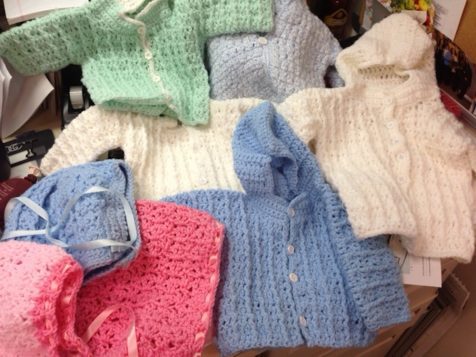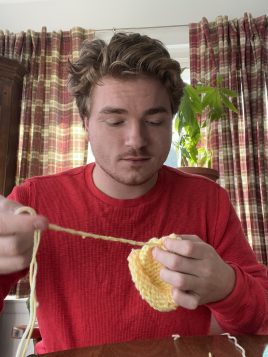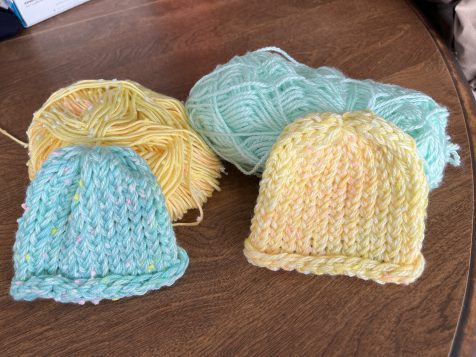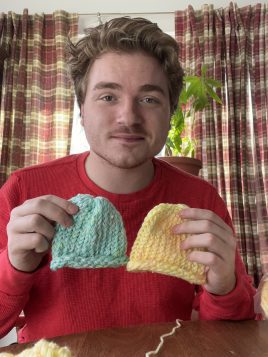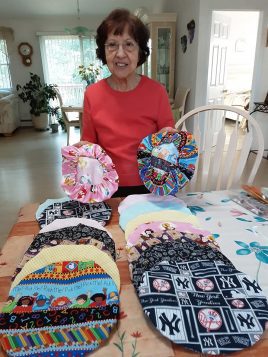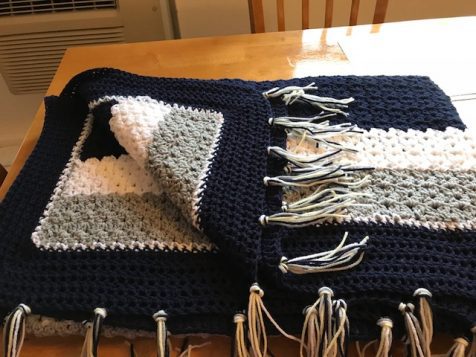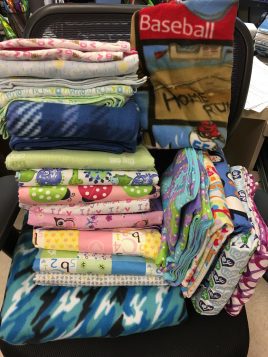Stony Brook Stitchers deliver comfort and compassion with a handmade touch
By Melissa Arnold
Spending any amount of time in a hospital setting is bound to be taxing, not just physically but emotionally. Sometimes, a little reminder that you’re being thought of and supported can make all the difference.
Since 2008, the Stony Brook Stitchers have volunteered their time and skill to knit, crochet and sew gifts for patients that could use a pick-me-up.

In the neonatal intensive care unit (NICU), families might receive a cute knit cap for their little one. In difficult situations where a baby passes away, a special wrap for the baby can be used to take treasured photos, and parents are given a memory pouch to hold mementos like a lock of hair. Patients in other departments, such as the cancer center or pediatric hospital, might curl up with an afghan, lap blanket or prayer shawl during their stay. Residents at the nearby Long Island State Veterans Home receive donations as well.
The project is a grassroots effort that began with hospital staff who wanted to brighten patients’ days.
Stitchers co-director Melissa Shampine grew up attending a small parochial school in Manhattan, where the boys were taught chess and the girls learned to crochet.
“Even though it was mandatory, I found that I actually liked it, and eventually learned to knit as well,” she recalled. “I really enjoyed being creative in that way.”
Shampine now works as a teaching hospital staff assistant at Stony Brook University Hospital. One of her former coworkers, Shakeera Thomas, was also a knitter, and together they began to brainstorm ways they could use their talents to benefit patients.
The idea spread through word of mouth, first among hospital staff, then across the street to the university. Nurse directors and health care providers identified patients who might want a gift. Students and employees from both campuses began donating yarn and got to work. Their numbers grew, and over time, even the surrounding communities got involved.

While the project is united under the Stitchers title, there are no official members or meetings. Some people work together at their churches, libraries or other small group settings, but countless others simply knit at home when they have the time.
In 2015, Jan Tassie responded to an email from Shakeera Thomas, inviting hospital employees to learn to crochet.
“I always wanted to learn to crochet, and someone tried to teach me years ago when I was pregnant with my first son, but it didn’t work out,” said Tassie, who recently retired from the university’s Office of Financial Aid and Scholarship Services. “When I met Shakeera, she promised that when she was done with me, I’d be able to crochet. And at the end of one day, I could.”
Thomas relocated shortly thereafter, and Tassie stepped into the role as co-director for the Stitchers.
“In the hospital and university settings, you always have people who come and go, so the numbers wax and wane. But Jan is motivated — she is the kind of person who will chat up people in the yarn aisle at craft stores, or through networking, so there are always hands to help. Our website is a labor of love for her, too. She’s done so much,” Shampine said.
The Stitchers come from all walks of life and skill levels. Some have been knitting for decades, while others learned recently with the intent of supporting the project.
Among them is Jack Domaleski, a 24-year-old from New Suffolk who took up knitting during the pandemic quarantine.
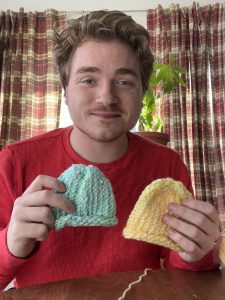
“During COVID, I taught myself to knit by watching videos on YouTube because I was bored and looking for something to do. It was easy to learn,” said Domaleski, who works in the restaurant industry. “My mom did it when I was younger, and it’s nice to end up with a finished product that you can share with others. I thought that it would be nice to donate to the hospital in some way, and when I wrote to them, they told me about the Stitchers.”
He was also inspired to knit by his own story. Domaleski was born several months premature, and spent nearly 90 days at Stony Brook’s NICU before he was strong enough to go home.
Today, he knits baby hats while thinking of other families going through similar circumstances.
“It helps me to feel connected to my own story, and anything you take the time to make is especially meaningful for the people that receive it,” he said.
For information about volunteering or donating yarn or handmade items to the Stony Brook Stitchers, visit www.stonybrookstitchers.com or send an email to Jan Tassie at [email protected].

